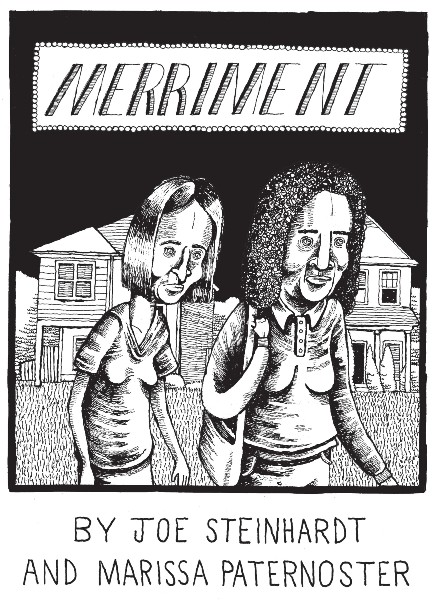Soundtrack to Melancholy: Notes on “Merriment”
Joe Steinhardt and Marissa Paternoster's graphic novel takes its protagonist to some unsettling places.

You don’t have to look too far to find a connection between underground music and comics. You might know Archer Prewitt from his work in the Sea and Cake and solo, or you might know him from his Eisner-nominated Sof'Boy. In the early 2000s, Bryan Lee O’Malley played indie rock under the name Kupek. Plastic Crimewave’s forays into musical history have manifested themselves in everything from nonfiction comics to sprawling psych-rock.
All of which is to say that there’s some precedent for the new graphic novel Merriment. It’s a collaboration between Joe Steinhardt and Marissa Paternoster, and if those names sound familiar to you, they should. Steinhardt runs the excellent indie label Don Giovanni Records and makes music under the name Modern Hut. Paternoster’s best known for her work on vocals and guitar in the recently-disbanded Screaming Females; her current musical project is Noun.

Merriment’s ties to the music world are present behind the scenes, but you don’t need to be a fan of any of the associated artists to appreciate this book. It’s not a story of touring musicians, frustrated artists, or favorite songs. Instead, in telling the story of a young woman named Mack who’s experiencing a crisis in her life, Steinhardt and Paternoster channel some of the same feelings that have given rise to a lot of great music: frustration, loneliness, and depression among them.
This is a slow-burning book. In Merriment, Mack returns to her hometown, has lengthy conversations with her friend Denise and embarks on a relationship with Jo, who lives in Brooklyn. Initially Merriment read like a story in a time-honored tradition: a story about people in their 20s struggling with their frustrated ambitions and romantic misadventures. Given that Mack’s move to New Jersey is due to the end of a relationship, it’s not hard to see how it fits this pattern…
…right up until the point that Steinhardt and Paternoster reveal that they’re up to something a little different here. As Mack’s frustration with the world around her accentuates and she begins to share her fears that she may have committed a murder, an especially unsettling aspect of Merriment comes into focus. Maybe this isn’t really a comic about a slacker finding their way in life. Maybe this is instead a book about a young woman having a psychological breakdown in slow motion.
In the second half of Merriment, that sense of disquiet comes to the forefront more and more. Mack goes on a road trip with her mother, and gestures that might have seemed quirkier earlier in the book — including checking a hotel mattress for dead bodies — instead ratchet up the tension.
That’s when the the unpredictability of Merriment emerges more fully. Steinhardt and Paternoster also include some surreal details here; a point in which Mack’s phone number turns up in another part of the state, for instance, could have a few plausible explanations or at least one deeply disquieting one. But that also means that there’s a contrast between the experience of reading this book and the experience of living it. Find patterns in the book you’re reading and you’re an attentive reader. Find patterns in the life you’re living and you’re experiencing paranoid delusions.
The mood of Merriment owes a lot to Paternoster’s art, which doesn’t really look like anything else I’ve ever seen. (Except, perhaps, for the illustrations Paternoster provided for her old band’s album covers.) There’s an archetypal “underground comics” feel to it — if you’d told me that this first appeared in an underground newspaper beside works by Art Spiegelman and Gary Panter in 1981, I’d believe you. Most of Merriment’s characters look haunted and depressed because, well, they are. The linework in the backgrounds of some of the panels adds a tactile quality here, as though the reader had stumbled into a project told entirely in linocuts.
If there’s one downside to that approach, it’s that a couple of the supporting characters end up looking very similar to one another. On the other hand, that might be intentional; Mack’s frustration at the sameness of suburban life taking on a literal form, like the use of Tom Noonan’s voice for the majority of the characters in the film Anomalisa. Ultimately, though, Merriment is a collaboration that gets under your skin. It rarely goes where you’d expect, and its characters’ shared histories have a lived-in quality. The title might be ironic, but the immersive qualities on display are anything but.